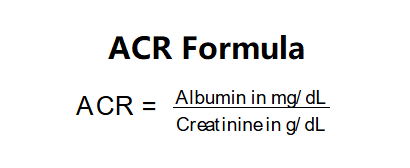1. What is an Albumin-Creatinine Ratio (ACR) Calculator?
Definition: The Albumin-Creatinine Ratio (ACR) Calculator measures the ratio of albumin to creatinine in urine, providing an indicator of kidney function and early detection of kidney disease.
Purpose: It helps clinicians assess albuminuria, a marker of kidney damage, often used in the management of diabetes and hypertension to monitor kidney health.
2. How Does the Calculator Work?
The calculator uses the following formula:
Unit Conversions (if needed):
- Creatinine: 1 mmol/L = 18 mg/dL
- Creatinine: 1 mg/dL = 0.056 mmol/L
- Creatinine in g/dL = Creatinine in mg/dL ÷ 1000
Steps:
- Input the urine albumin concentration in mg/dL and creatinine concentration, selecting the appropriate unit (mg/dL or mmol/L).
- Validate inputs (albumin cannot be negative, creatinine must be greater than zero).
- Convert creatinine to mg/dL if provided in mmol/L.
- Convert creatinine from mg/dL to g/dL by dividing by 1000.
- Calculate the ACR by dividing albumin by creatinine (in g/dL).
- Display the result, rounded to 2 decimal places.
3. Importance of ACR Calculations
Calculating the ACR is important for:
- Early Detection: Identifies early kidney damage, especially in patients with diabetes or hypertension, before significant kidney function loss occurs.
- Monitoring Disease: Helps track progression of kidney disease and the effectiveness of treatments like ACE inhibitors or lifestyle changes.
- Risk Stratification: Elevated ACR levels (e.g., >30 mg/g) indicate increased risk of cardiovascular disease and kidney failure, guiding clinical management.
4. Using the Calculator
Examples:
- Example 1: Albumin: 30 mg/dL, Creatinine: 100 mg/dL (0.1 g/dL)
- ACR: \( \frac{30}{0.1} = 300.00 \, \text{mg/g} \)
- Example 2: Albumin: 72 mg/dL, Creatinine: 65 mmol/L
- Convert Creatinine: \( 65 \times 11.31 = 735.15 \text{ mg/dL} = 0.73515 \text{ g/dL} \)
- ACR: \( \frac{72}{0.73515} = 97.95 \, \text{mg/g} \)
5. Frequently Asked Questions (FAQ)
Q: What does a high ACR indicate?
A: An ACR above 30 mg/g suggests albuminuria, which may indicate kidney damage, often seen in diabetes or hypertension.
Q: How often should ACR be measured?
A: For patients with diabetes, annual screening is recommended; more frequent testing may be needed if kidney disease is suspected or progressing.
Q: Can lifestyle changes affect ACR?
A: Yes, managing blood sugar, blood pressure, and adopting a healthy diet can reduce albuminuria and lower ACR, slowing kidney disease progression.
Albumin-Creatinine Ratio (ACR) Calculator© - All Rights Reserved 2025
 Home
Home
 Back
Back
